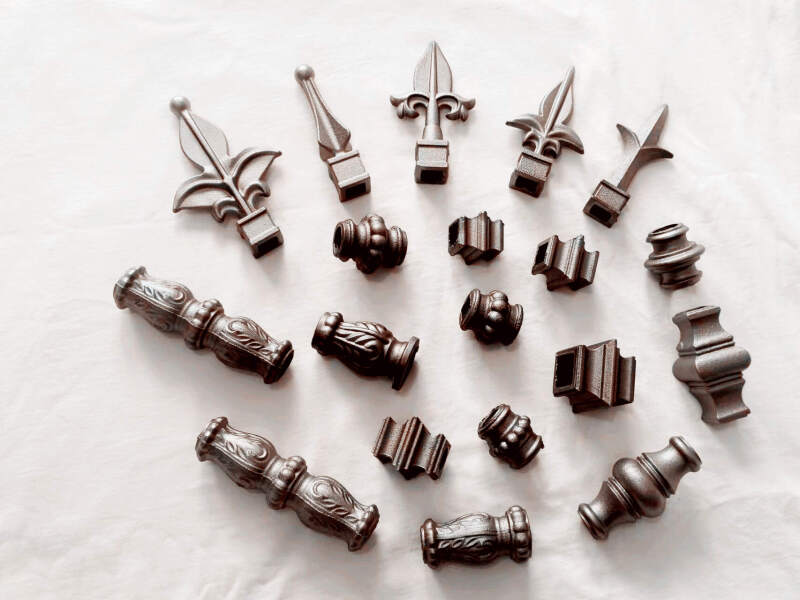
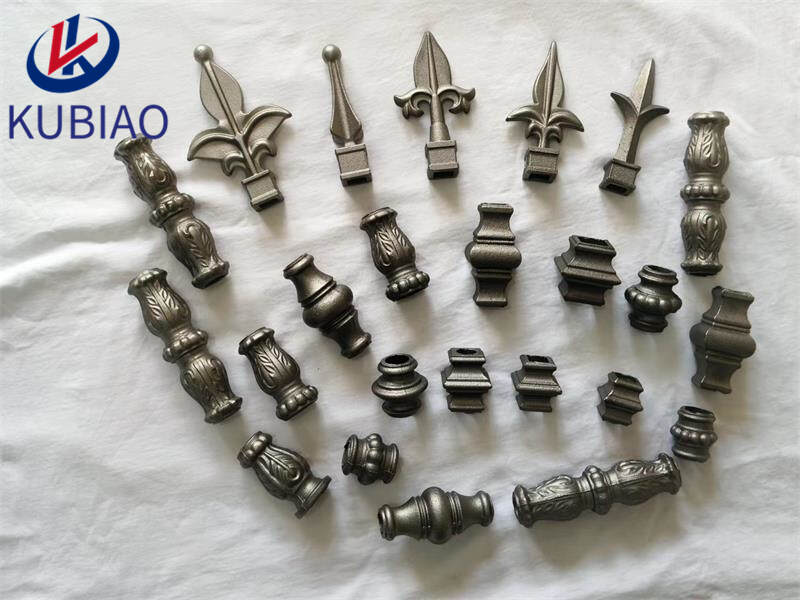
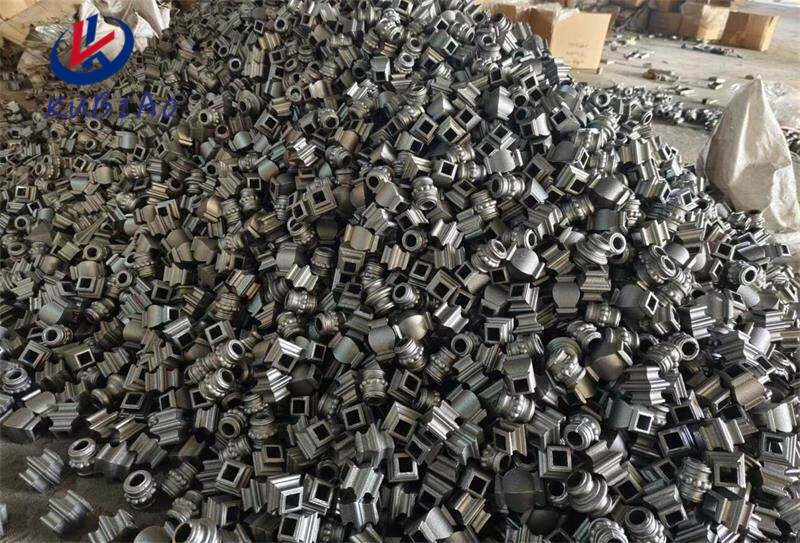
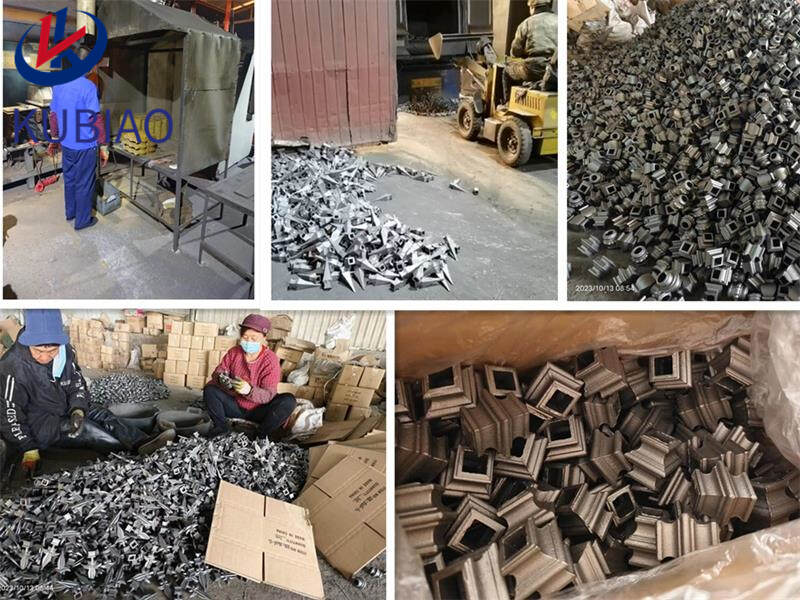
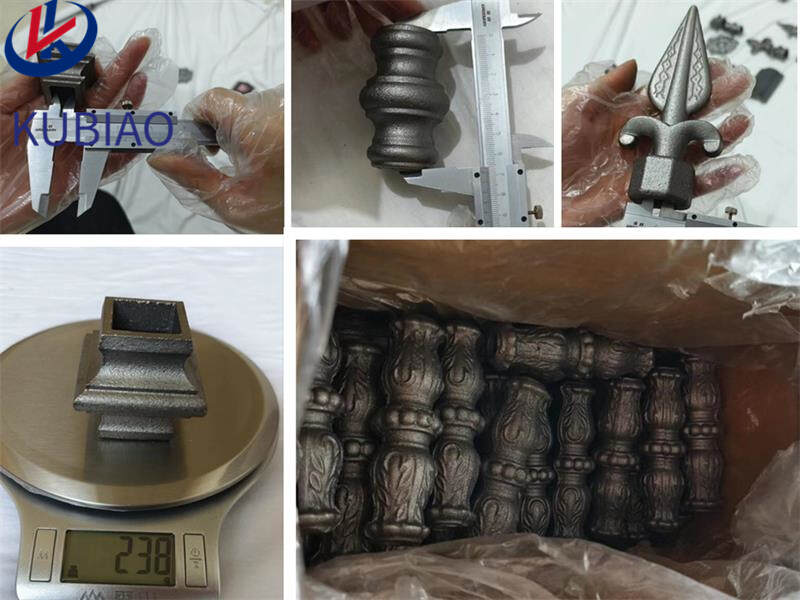
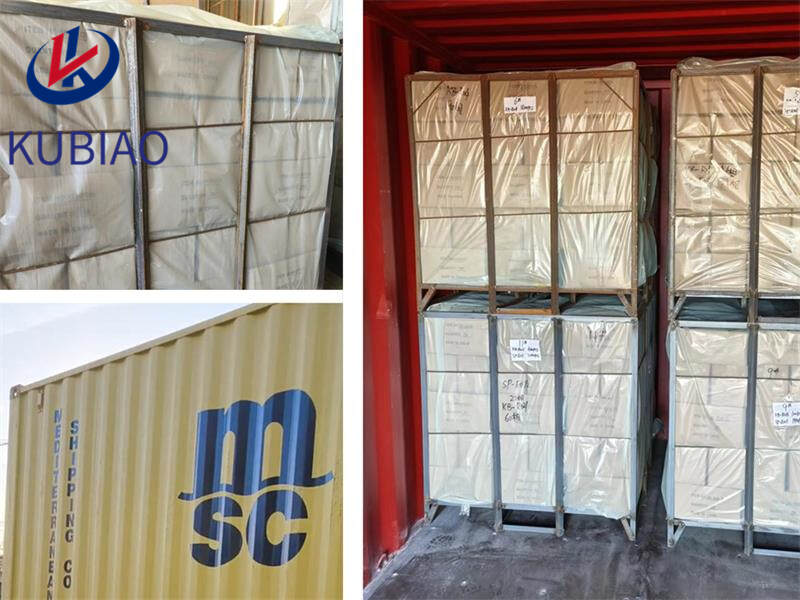
| Product name | iron fence accessories |
| Keyword | cast iron fence parts ,cast iron cap,iron ornament ,fence accessories ,decorative iron ornament ,cast iron fence ornaments,iron fence accessories ,cast iron fence spears |
| Place of Origin | China |
| Quality standard | We have our own professional QC team to insure the quality. |
| Feature | Cast iron is a strong metal material that can withstand large amounts of pressure and weight. It is also durable and resistant to corrosion, making it ideal as a decorative item |
| Application scope | garden, etc. |
| surface treatment | sand blasting antirust antirust oil/water painting hot dip galvanizing |
| Unit Weight(g) | 512(Contact us for specific information to confirm) |
| terms of payment | 50% T/T in advance, balance before shipment. |
| Life span | 28 years (Contact us for specific information to confirm) |
| delivery time | It usually takes 40 days. |
| Advantage | We keep good quality and competitive price to ensure our customers benefit |
| Packing | 14x10.87x9.8cm(Contact us for specific information to confirm) |
| OEM/ODM | Customization Service Provided |
| design | beautiful elegance sleek pretty |
| Sales country | All over the world for example:Mauritania,Australia,Saint Kitts and Nevis,Laos,Philippines,Oman |
| MOQ | 251pcs(Contact us for specific information to confirm) |
1.How long do iron fence accessories typically last?
We attach importance to the innovation ability and team spirit of employees, have advanced R & D facilities and laboratories, and have a good quality management system.
Cast iron ornaments can last for decades or even centuries if they are properly cared for and maintained. However, their lifespan can vary depending on factors such as exposure to harsh weather conditions, regular cleaning and maintenance, and the quality of the cast iron itself. With proper care, cast iron ornaments can last for generations.
2.Are there any DIY techniques for creating my own iron fence accessories ?
We have a good reputation and image in the industry. The quality and price advantage of iron fence accessories products is an important factor in our hard overseas market.
1. Sand Casting: This method involves creating a mold using sand and pouring molten cast iron into it. You can use a wooden pattern or a 3D printed mold to create intricate designs. Once the iron has cooled and solidified, the sand can be removed to reveal the ornament.
2. Clay Casting: Similar to sand casting, this method involves creating a mold using clay instead of sand. The clay can be molded into any shape or design and then coated with a layer of sand before pouring in the molten iron. Once cooled, the clay can be removed to reveal the ornament.
3. Lost Wax Casting: This technique involves creating a wax model of the ornament and then coating it with a layer of ceramic. The wax is then melted out, leaving a hollow ceramic mold. Molten iron is then poured into the mold and once cooled, the ceramic can be broken away to reveal the ornament.
4. Repurposed Molds: You can also use existing objects such as cookie cutters, silicone molds, or even household items like bottle caps or keys to create unique cast iron ornaments. Simply pour the molten iron into the mold and let it cool before removing the ornament.
5. Sandpaper Etching: If you don't have access to molten iron, you can still create a cast iron look by using sandpaper to etch designs onto a piece of metal. You can then paint the metal with a rust-colored paint to give it an aged look.
6. Welding: If you have some welding skills, you can create your own cast iron ornaments by welding together pieces of scrap metal. You can use a grinder to smooth out any rough edges and give it a more polished look.
7. 3D Printing: If you have access to a 3D printer, you can design and print your own cast iron ornaments using a special filament that contains iron particles. Once printed, the ornament can be heated to fuse the iron particles together, giving it a cast iron appearance.
Remember to always take proper safety precautions when working with molten iron or welding equipment. It is also important to properly dispose of any leftover materials and follow local regulations for metalworking.
3.What are the benefits of using iron fence accessories in decor?
iron fence accessories is not a product only, but also can help you comes to money-making.
1. Durability: Cast iron is a strong and durable material that can withstand harsh weather conditions and last for many years without losing its shape or color.
2. Versatility: Cast iron ornaments come in a variety of shapes, sizes, and designs, making them suitable for various decor styles and themes.
3. Timeless appeal: Cast iron has been used in decor for centuries, and its classic and elegant look never goes out of style.
4. Low maintenance: Cast iron ornaments require minimal maintenance, making them a practical choice for busy homeowners.
5. Adds character: The intricate designs and details of cast iron ornaments can add character and charm to any space.
6. Affordable: Cast iron ornaments are relatively affordable compared to other decorative materials, making them a budget-friendly option for home decor.
7. Indoor and outdoor use: Cast iron ornaments can be used both indoors and outdoors, making them a versatile choice for decorating any space.
8. Rust-resistant: Most cast iron ornaments are treated with a rust-resistant coating, making them suitable for outdoor use without worrying about corrosion.
9. Eco-friendly: Cast iron is a sustainable and eco-friendly material, making it a popular choice for those looking for environmentally friendly decor options.
10. Customizable: Cast iron ornaments can be customized to fit specific design preferences, making them a unique and personalized addition to any space.
4.How do I protect iron fence accessories during extreme weather conditions?
We focus on providing high iron fence accessories quality products and services.
1. Apply a protective coating: Before extreme weather hits, apply a protective coating to your cast iron ornaments. This can be a clear sealant or a coat of paint specifically designed for metal surfaces. This will create a barrier between the ornament and the elements, preventing rust and corrosion.
2. Bring them indoors: If possible, bring your cast iron ornaments indoors during extreme weather conditions. This will protect them from rain, snow, and harsh winds. If you have a covered porch or patio, you can also move them there for added protection.
3. Cover them up: If bringing the ornaments indoors is not an option, cover them with a tarp or plastic sheeting. This will protect them from direct exposure to rain and snow. Make sure to secure the cover tightly to prevent it from blowing away in strong winds.
4. Keep them off the ground: If your ornaments are placed on the ground, they are more susceptible to damage from moisture and freezing temperatures. Elevate them on a pedestal or stand to keep them off the ground and away from standing water.
5. Remove snow and ice: If your ornaments do get covered in snow or ice, make sure to remove it as soon as possible. The weight of snow and ice can cause damage to the delicate details of the ornament and can also lead to rusting.
6. Regular maintenance: Regularly inspect your cast iron ornaments for any signs of damage or rust. If you notice any issues, address them immediately to prevent further damage.
7. Store them properly: If you live in an area with extreme weather conditions, consider storing your cast iron ornaments indoors during the off-season. This will protect them from prolonged exposure to harsh elements and extend their lifespan.
5.Are there any eco-friendly options for iron fence accessories ?
We are committed to providing personalized solutions and established long -term strategic cooperative relationships with customers.
Yes, there are several eco-friendly options for cast iron ornaments:
1. Recycled Cast Iron: Look for cast iron ornaments that are made from recycled materials. This reduces the need for new resources and helps to minimize waste.
2. Sustainable Production: Some companies use sustainable production methods, such as using renewable energy sources and minimizing water usage, to create their cast iron ornaments.
3. Organic Coatings: Instead of traditional paint or varnish, some cast iron ornaments are coated with organic materials, such as linseed oil or beeswax, which are more environmentally friendly.
4. Fair Trade: Look for cast iron ornaments that are certified as fair trade, meaning they are produced in an ethical and sustainable manner, and workers are paid fair wages.
5. Vintage or Secondhand: Consider purchasing vintage or secondhand cast iron ornaments instead of new ones. This reduces the demand for new production and gives new life to old items.
6. DIY: If you have some basic metalworking skills, you can create your own cast iron ornaments using recycled materials or scrap metal.
7. Upcycled: Some companies specialize in upcycling old cast iron items, such as old radiators or pipes, into unique and eco-friendly ornaments.
8. Biodegradable Packaging: When purchasing cast iron ornaments, look for companies that use biodegradable or recyclable packaging materials to reduce waste.
9. Local Production: Choosing cast iron ornaments that are locally produced reduces the carbon footprint associated with transportation and supports your local economy.
10. Longevity: Cast iron ornaments are known for their durability and longevity. By choosing high-quality, long-lasting ornaments, you can reduce the need for frequent replacements and ultimately reduce waste.
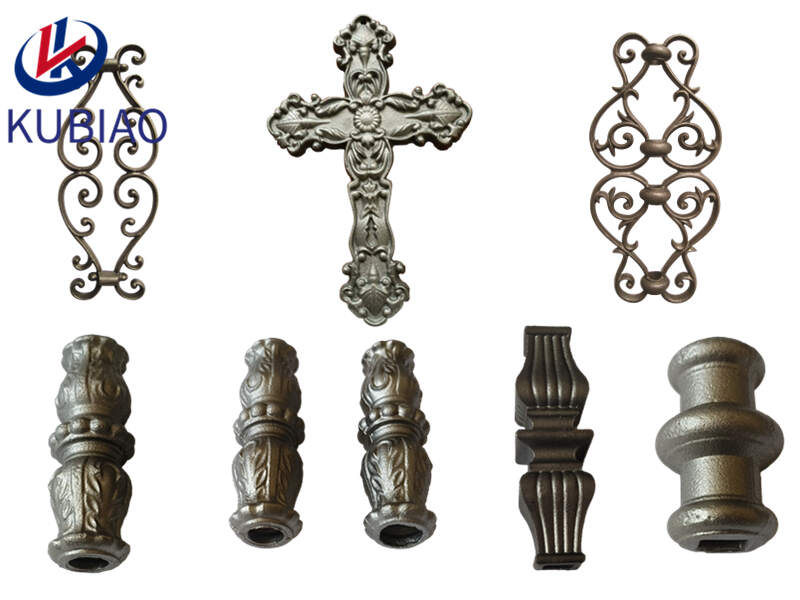
6.What is the history of iron fence accessories ?
We pay attention to the introduction and training of talents, scientifically regulate the management system, and focus on cultural construction and team cohesion.
Cast iron ornaments have a long and rich history dating back to ancient civilizations. The use of cast iron for decorative purposes can be traced back to the 5th century BC in China, where it was used to create intricate and ornate objects such as bells and statues.
In Europe, the use of cast iron for decorative purposes began in the 15th century, with the production of cast iron firebacks and grates for fireplaces. These were often adorned with intricate designs and patterns, and were considered a symbol of wealth and status.
During the Industrial Revolution in the 18th and 19th centuries, cast iron became more widely available and affordable, leading to an increase in its use for decorative purposes. Cast iron ornaments were used to decorate buildings, parks, and gardens, and were also popular as household items such as door knockers, garden furniture, and garden urns.
In the late 19th and early 20th centuries, the Victorian era saw a surge in the popularity of cast iron ornaments. The ornate and elaborate designs of the Victorian era were perfectly suited to the versatility of cast iron, and it was used extensively in the construction of buildings, bridges, and other structures.
However, with the advent of new materials such as steel and aluminum, the use of cast iron for decorative purposes declined in the 20th century. It was not until the lat<
br> 20th century that there was a renewed interest in cast iron ornaments, with a growing appreciation for their historical and aesthetic value.
Today, cast iron ornaments are still used to decorate buildings, parks, and gardens, and are also popular as collectibles and antiques. They are valued for their durability, intricate designs, and historical significance, and continue to be a popular choice for adding a touch of elegance and charm to any space.
7.Can I use iron fence accessories as part of a fireplace mantel display?
We continue to invest in research and development and continue to launch innovative products.
Yes, you can use cast iron ornaments as part of a fireplace mantel display. Cast iron ornaments can add a rustic and vintage touch to your mantel display and can be used to hold candles, vases, or other decorative items. Just make sure to properly secure them to the mantel to prevent any accidents.
8.Are there any common design elements found in iron fence accessories ?
1. Intricate Details: Cast iron ornaments often feature intricate and detailed designs, such as floral patterns, scrollwork, and geometric shapes.
2. Curved and Organic Shapes: Many cast iron ornaments have curved and organic shapes, which are achieved through the casting process.
3. Symmetry: Symmetry is a common design element in cast iron ornaments, with designs often being mirrored on both sides.
4. Repetition: Many cast iron ornaments feature repeated patterns or motifs, creating a sense of unity and cohesion in the design.
5. Textures: Cast iron ornaments can have a variety of textures, including smooth, rough, and hammered surfaces, adding visual interest and depth to the design.
6. Finials and Fleur-de-lis: Finials, which are decorative end pieces, and fleur-de-lis, a stylized lily flower, are commonly found in cast iron ornaments, adding a touch of elegance and sophistication.
7. Gothic and Victorian Influences: Cast iron ornaments often draw inspiration from Gothic and Victorian architecture, featuring pointed arches, spires, and intricate details.
8. Natural Elements: Many cast iron ornaments incorporate natural elements, such as leaves, flowers, and animals, into their designs.
9. Rustic and Industrial Aesthetics: Cast iron ornaments can also have a rustic or industrial aesthetic, with rough textures and simple, geometric designs.
10. Black or Dark Colors: Due to the nature of cast iron, most ornaments are black or dark in color, adding a sense of drama and contrast to the design.
9.Are iron fence accessories weather-resistant?
We maintain a stable growth through reasonable capital operations, focus on industry development trends and cutting -edge technologies, and focus on product quality and safety performance.
Yes, cast iron ornaments are weather-resistant. They are made from a durable and strong material that can withstand various weather conditions, including rain, snow, and extreme temperatures. However, over time, they may develop rust if not properly maintained. It is recommended to regularly clean and seal cast iron ornaments to ensure their longevity and weather-resistance.
10.How do I protect iron fence accessories from rust?
We pay attention to user experience and product quality, and provide the best product quality and lowest production cost for cooperative customers.
1. Clean and dry the ornaments: Before applying any protective coating, make sure the ornaments are clean and dry. Use a wire brush or sandpaper to remove any rust or dirt.
2. Apply a rust converter: Rust converters are chemical solutions that convert rust into a stable compound that can be painted over. Apply the converter according to the manufacturer's instructions and let it dry completely.
3. Use a rust-inhibiting primer: Once the rust converter has dried, apply a rust-inhibiting primer to the ornaments. This will create a barrier between the metal and the environment, preventing rust from forming.
4. Paint with a rust-resistant paint: After the primer has dried, paint the ornaments with a rust-resistant paint. This type of paint contains additives that prevent rust from forming.
5. Apply a clear coat: For added protection, you can apply a clear coat over the painted surface. This will provide an extra layer of protection against moisture and other elements.
6. Keep the ornaments dry: Moisture is the main cause of rust, so it's important to keep the ornaments dry. If they are placed outdoors, make sure they are covered or brought inside during rainy or humid weather.
7. Reapply protective coating regularly: Over time, the protective coating on the ornaments may wear off. It's important to reapply the rust converter, primer, and paint every few years to keep the ornaments protected.
8. Store indoors during winter: If possible, store the ornaments indoors during the winter months to protect them from harsh weather conditions.
9. Use a rust inhibitor: You can also use a rust inhibitor spray or gel to protect the ornaments. These products create a thin film over the metal, preventing rust from forming.
10. Regularly inspect and maintain: Regularly inspect the ornaments for any signs of rust and touch up any areas that may need it. This will help prevent rust from spreading and keep your ornaments looking like new.
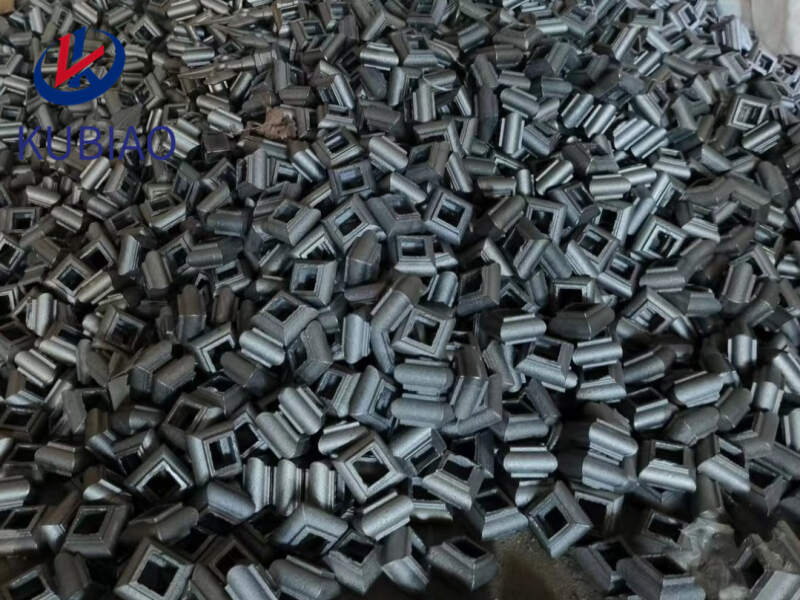
11.Are iron fence accessories easy to install?
We should have a stable supply chain and logistics capabilities, and provide customers with high -quality, low -priced iron fence accessories products. It depends on the specific ornament and the installation method. Some cast iron ornaments may be easy to install with simple screws or brackets, while others may require more complex installation techniques such as drilling or welding. It is important to carefully read the installation instructions and have the necessary tools and skills before attempting to install a cast iron ornament.
12.What types of designs can be found on iron fence accessories ?
As one of the iron fence accessories market leaders, we are known for innovation and reliability.
1. Floral designs: These can include intricate patterns of flowers, leaves, and vines.
2. Animal designs: Cast iron ornaments can feature various animals such as birds, butterflies, horses, and more.
3. Geometric designs: These can range from simple geometric shapes to more complex patterns and designs.
4. Architectural designs: Cast iron ornaments can also feature architectural elements such as columns, arches, and pillars.
5. Religious designs: Some cast iron ornaments may have religious symbols or figures, such as crosses or angels.
6. Nautical designs: These can include anchors, ships, lighthouses, and other maritime elements.
7. Mythological designs: Cast iron ornaments may also feature mythical creatures such as dragons, unicorns, or mermaids.
8. Traditional designs: These can include classic designs such as fleur-de-lis, scrolls, and medallions.
9. Seasonal designs: Some cast iron ornaments may have designs related to specific seasons, such as snowflakes for winter or flowers for spring.
10. Custom designs: Many cast iron ornaments can be custom-made with personalized designs, such as family names or monograms.
13.How have iron fence accessories evolved over time?
We focus on innovation and continuous improvement to maintain a competitive advantage.
Cast iron ornaments have evolved significantly over time, both in terms of their design and production methods. Here are some key changes that have occurred:
1. Early designs: The earliest cast iron ornaments were simple and functional, such as door knockers, hinges, and fireplace tools. These were often made using sand casting techniques and had a utilitarian look.
2. Victorian era: In the mid-19th century, cast iron ornaments became more decorative and ornate, reflecting the Victorian love for intricate designs and embellishments. This era saw the rise of cast iron garden furniture, fountains, and statues, often featuring elaborate floral and animal motifs.
3. Industrial revolution: With the advent of the industrial revolution, cast iron ornaments became more affordable and accessible to the middle class. This led to a proliferation of cast iron products, including street lamps, railings, and building facades.
4. Art Nouveau and Art Deco: In the late 19th and early 20th centuries, cast iron ornaments were influenced by the Art Nouveau and Art Deco movements, which favored more fluid and geometric designs respectively. This led to the creation of cast iron gates, grilles, and other architectural elements with intricate patterns and motifs.
5. Modern era: In the 20th century, cast iron ornaments continued to evolve, with a focus on functionality and minimalism. Modern designs often feature clean lines and geometric shapes, and are used in a variety of applications, from furniture to home decor.
6. Production methods: While sand casting was the primary method of producing cast iron ornaments in the past, modern techniques such as die casting and investment casting have made the process more efficient and precise. This has allowed for the creation of more intricate and detailed designs.
7. Materials: While cast iron was the preferred material for ornaments in the past, modern advancements have led to the use of other materials such as aluminum and bronze. These materials offer greater strength and durability, while still retaining the look and feel of cast iron.
Overall, cast iron ornaments have evolved from simple and functional objects to highly decorative and versatile pieces, reflecting the changing tastes and advancements in technology over time.
14.Are there any cultural or symbolic meanings behind certain cast iron ornament designs?
We actively participate in the iron fence accessories industry associations and organization activities. The corporate social responsibility performed well, and the focus of brand building and promotion
Yes, there are several cultural and symbolic meanings associated with certain cast iron ornament designs. Some common examples include:
1. Fleur-de-lis: This symbol, which resembles a stylized lily or iris, is often associated with French culture and royalty. It is also used as a symbol of purity, light, and life.
2. Celtic Knots: These intricate designs, often seen in Celtic and Irish cultures, symbolize eternity, continuity, and interconnectedness.
3. Dragon: In many Asian cultures, dragons are seen as powerful and auspicious creatures, representing strength, wisdom, and good luck.
4. Sunburst: This design, featuring rays of light emanating from a central point, is often associated with the sun and its life-giving properties. It can also symbolize enlightenment and spiritual growth.
5. Pineapple: In Western cultures, the pineapple is often seen as a symbol of hospitality, warmth, and welcome.
6. Tree of Life: This design, featuring a tree with spreading branches and deep roots, is a common symbol in many cultures, representing the interconnectedness of all living things and the cycle of life.
7. Anchor: In maritime cultures, the anchor is a symbol of stability, strength, and hope.
8. Cross: The cross, a symbol of Christianity, is often seen in cast iron designs and can represent faith, sacrifice, and redemption.
9. Horseshoe: In many cultures, the horseshoe is seen as a symbol of good luck and protection.
10. Star of David: This six-pointed star is a symbol of Judaism and can represent unity, balance, and divine protection.
15.What are iron fence accessories ?
We have flexible production capacity. Whether you are large orders or small orders, you can produce and release goods in a timely manner to meet customer needs.
Cast iron ornaments are decorative objects made from cast iron, a type of iron that is heated until it becomes molten and then poured into a mold to create a specific shape. These ornaments can range from small figurines and sculptures to larger architectural elements such as columns, balusters, and finials. They are often used to add a touch of elegance and charm to gardens, homes, and other outdoor spaces. Cast iron ornaments are known for their durability and can withstand harsh weather conditions, making them a popular choice for outdoor decor. They can also be painted or finished in various colors and styles to suit different design preferences.
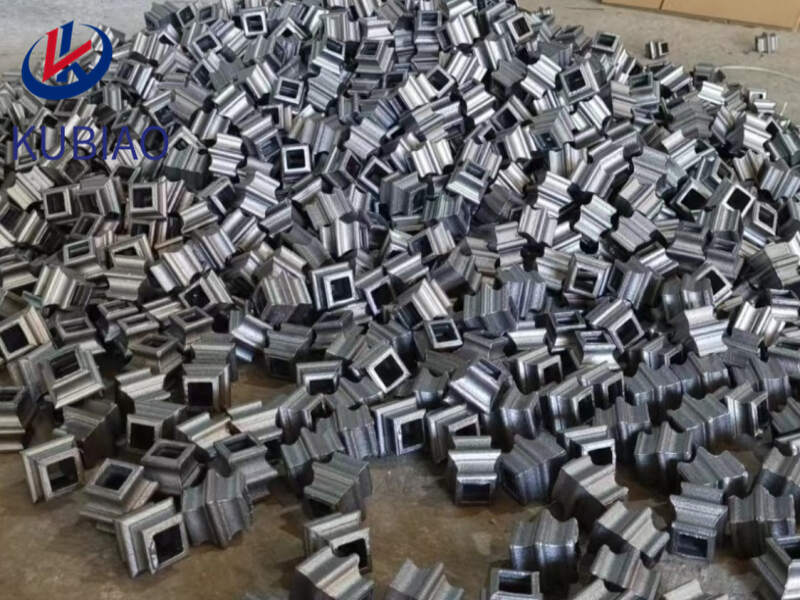
Welcome to contact us for Cast Iron Order!
Email: sales@kubiaometal.com
Cellphone/Whatsapp: 0086 13020588163
Wechat: 13028588163
Tag:iron ornamental design ,cast iron collars,cast iron fence ornamental ,ornamental iron flower ,metal fence stud ,gate collar ,fence ornamental casting ,cast iron spear top
PREV: iron fence ornament
NEXT: iron door panel
Product
Category